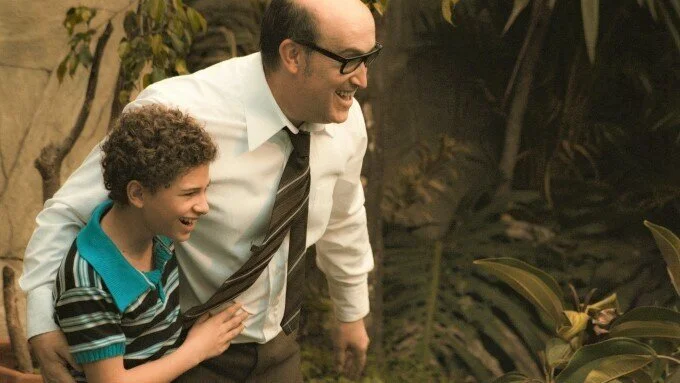Memories of My Father
A biopic which adopts an unusual approach almost makes it two films in one.
Javier Cámara as Héctor
Outside of Colombia, the name of Héctor Abad Gómez may well be relatively unfamiliar but in his own country he is remembered as a medical man and a professor whose social concerns led him to play a major role in matters of public health. Such matters as the state of the drains and the need to provide vaccines to tackle typhus became the subject of articles that he wrote for the press and he would in time become a thorn in the side of the authorities. He was attacked as a Communist and as a Fascist and he did indeed turn to activism. That would put him even more at risk in the 1980s as his pursuit of social injustice increased.
Of the six children born to the doctor and his wife, Cecilia, only one was a boy and he, also named Héctor, is the author of a book written in tribute to his father. This film, which was submitted as Colombia's entry for the 2021 Oscars, is derived from that book. It could certainly be argued that the doctor is a man well deserving of being made the subject of a biopic, but the approach that has been taken by Fernando Trueba who uses a screenplay by his brother David is rather an odd one.
Memories of My Father starts in 1983 and far from Colombia in order to introduce us to the son (Juan Pablo Urrego) who at that time is living in Turin as a student. These opening scenes, relatively brief, are photographed in black and white but then a summons back to Colombia leads into what seems like a different film entirely. Set in 1971 initially and filmed in colour, it settles into being a long and detailed portrait of young Héctor's childhood in Colombia and it presents his father (Javier Cámara) as an almost idealised figure. Unlike his wife (Patricia Tamayo), he is not religious, but his honesty in this regard is shown in positive terms and, whether telling a bedtime story or ensuring that his son does not feel guilty about masturbating, he is seen as a perfect father. At one point in this part of the film a death does occur, but even so what emerges is a rather cosy picture of family life. For some that will be a part of the film's appeal and these recollections of childhood are certainly presented very smoothly. Indeed, they have a warmth of the kind that makes Tornatore's Cinema Paradiso such a favourite even today. It is undoubtedly helpful that Nicolás Reyes Cano playing the young Héctor is very good indeed.
It is about half way through that Memories of My Father reverts to black and white images and to 1983 but it now shows scenes in Colombia in the city of Medellin. References are made to bombs going off but, if that is a clear indication of tensions in the country, few details are supplied and indeed at this point the film starts to move rather abruptly from one episode to another. There's a sudden drama when the son drives carelessly and nearly causes a fatality and no less unexpectedly we find it being suggested that the good doctor's social and political commitments are causing him to neglect his family. It then feels odd that we should return to Turin again with a brief reprise of the opening scenes before the film switches back to the father who is seen being forced into compulsory retirement from his teaching. Next the film jumps to 1987 and shows that, despite his retirement, the doctor is approving protests made by students and is considering standing as mayor, a move that sees him facing death threats. This situation does result in the film building to a dramatic climax but, if the film’s second half is quite different in character from the long childhood flashback, the 1980s narrative nevertheless comes across as a thing of bits and pieces that do not always cohere effectively. There's a further reference to Cecilia being neglected by her husband but it emerges only in passing as though the film doesn't want to look too closely at anything that counts against the film's hero. Rather bizarrely, what it does find time for is a couple of scenes relating to screenings of Visconti's Death in Venice. We glimpse the film itself yet even when that occurs in the coloured section of Memories of My Father we see it in black and white! More understandably given the number of siblings it is at times difficult to identify clearly all five of the daughters. All of these factors add to the impression that, despite the able performances, Trueba's film lacks the consistency of tone and the strength which in view of the subject matter might reasonably have been expected. It is watchable certainly, but the impact amounts to less than one would have anticipated.
Original title: El olvido que seremos.
MANSEL STIMPSON
Cast: Javier Cámara, Patricia Tamayo, Juan Pablo Urrego, Nicolás Reyes Cano, Kami Zea, María Teresa Barreto, Laura Londoño, Elizabeth Minotta, Luciana Echeverry, Camila Zarate, Aida Morales, Sebastián Giraldo, Luz Myriam Guarín, Whit Stillman.
Dir Fernando Trueba, Pro Dago García, Screenplay David Trueba, from the book Oblivion: A Memoir by Héctor Abad Faciolince, Ph Sergio Iván Castaño, Art Dir Camilo Ospina and Leonie Heys-Cerchio, Ed Marta Velasco, Music Zbigniew Preisner, Costumes Ana María Urrea.
Caracol Telelvisión/Dago García Producciones-Curzon Artificial Eye.
136 mins. Colombia. 2020. Rel: 26 March 2021. Available on Curzon Home Cinema. No Cert.


